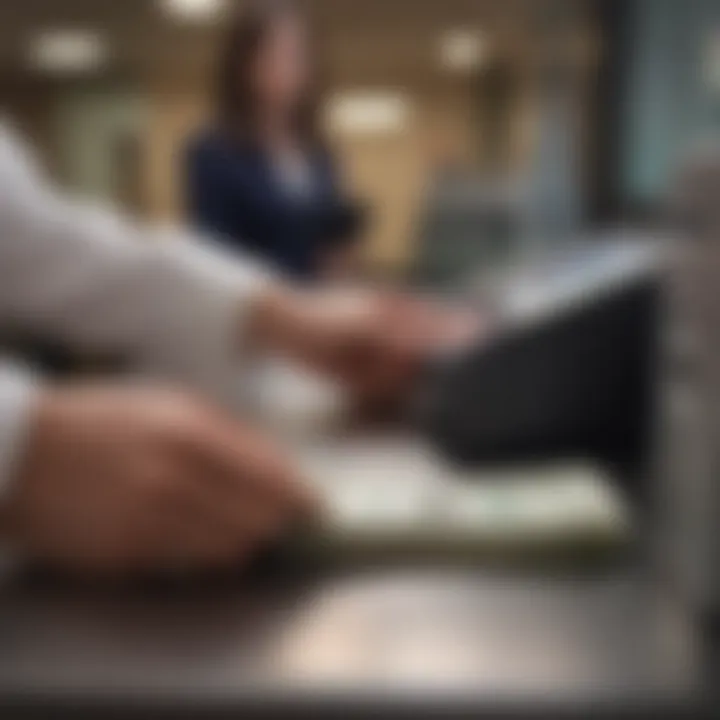Obtaining Money Orders at Banks: A Complete Guide


Intro
Obtaining a money order can often seem daunting for those unfamiliar with their process. Money orders serve as a secure payment option and can be particularly useful in situations where personal checks are not accepted. This comprehensive guide will navigate the complexities of acquiring a money order at banks, highlighting key points such as the benefits inherent in using banks over other providers, necessary requirements, and expected fees. Understanding the potential gaps in information is crucial, as it allows individuals to make informed financial decisions about this particular form of payment.
Understanding Money Orders
Money orders are pre-paid certificates that function as a secure form of payment. They can be useful in avoiding the risks associated with cash or the limitations of personal checks. Major banks such as Chase Bank, Wells Fargo, and Bank of America typically offer money orders. This section highlights the crucial aspects without unnecessary complexity.
- Reliability: Money orders are generally considered safe since funds are guaranteed when purchasing. This reduces the likelihood of returned payments.
- Convenience: A trip to the bank is often more accessible than other locations, such as grocery stores or convenience shops, where the issuance may vary.
A money order is often ideal for bill payments, sending funds to remote locations, or making transactions without a direct bank connection. For many, this financial product serves as a trustworthy avenue tailored for various forms of transactions.
Required Documentation for Money Orders
When obtaining a money order, certain identification is usually required. Though requirements may fluctuate by bank, there are common factors that individuals should anticipate. Individuals often need to provide:
- An official ID: This can typically be a driver's license, passport, or government-issued ID card.
- Proof of address: Recently dated bills or statements may serve well for this purpose.
- The correct amount of payment: The total should comprise the money order cost plus any associated fees.
Being prepared with these documents can streamline the process and allay potential complications.
Possible Fees Behind Money Orders
As with many financial transactions, there are fees attached to money orders, albeit they tend to vary based on location and the institution's policies. Attending to these aspects is essential in terms of budgeting, as costs could range approximately between $5 to $25 per transaction. Individual banks may have rate sheets or a branch-specific fee schedule that outlines avoidable expenses. Understanding these fees may heighten financial awareness and enhance efficiency in future transactions.
Benefits of Bank-issued Money Orders
Choosing to obtain a money order directly from a bank has a few advantages compared to other locations. Some notable points include:
- Safety: Banks maintain procedures to provide secure service environments, thus assuring customers of their transactional safety.
- Institutional Trust: Banks hold substantial reputation, making dealings more legitimate than some other outlets.
- Financing Structures: Some banks can offer linked financial product access for seamless financial management, which non-bank handlers may lack.
Each benefit can alleviate concerns regarding reliability, especially in an age where digital transactions are progressively visible.
Finale
In summary, obtaining a money order from a bank can be an efficient and secure option for many financial transactions. Preparing documentation, understanding associated fees, and recognizing the advantages can bring clarity and confidence into each transaction. Staying informed and aware enhances an individual's capacity to navigate the financial landscape successfully and makes for better financial decision-making overall.
Understanding Money Orders
Understanding money orders is crucial for anyone looking to manage their finances effectively. This section aims to shed light on the basic principles behind money orders, why individuals may utilize them, and key distinctions they hold, particularly when compared to conventional payment methods like checks. Gaining knowledge in this area empowers consumers to make informed choices when considering the best methods for transferring funds securely and efficiently.
Definition of a Money Order
A money order is a prepaid financial instrument, used as a form of payment. It represents a guaranteed payment source and can usually be acquired at various locations, including banks and postal services. Unlike personal checks, money orders are paid for upfront and do not rely on the potential clearance of funds from a checking account.
Intended Uses of Money Orders
Money orders serve several purposes:
- Bill Payment: Many people use money orders to settle bills, particularly when paying entities that may not accept personal checks.
- Gift Giving: They can be a controlled way of gifting money, assuring the recipient receives a secure and guaranteed amount.
- Business Transactions: They are often employed in business transactions where assuring payment upfront is necessary.
- Remote Payments: When conducting transactions in person isn't feasible, money orders offer a ood way to send funds without requiring a bank account.
Differences Between Money Orders and Checks
It is important to be aware of subtle diferences between these two payment methods:
- Security: Money orders can't bounce like checks can, providing a more secure option.
- Fees: Money orders come with a nominal fee, while checks are free but rely on account balances.
- Acceptance: Not everywhere accepts money orders; however, they are still a widely recognized payment method in many industries.


Understanding these differences ensures that individuals choose the payment method best suited to their specific needs.
Can Get a Money Order at a Bank?
If you are in need of a safe and convenient way to send money, understanding whether you can obtain a money order at a bank is crucial. Money orders provide a secure means of payment. Banks are one of the primary places offering these financial tools. This section helps clarify how banks function in this aspect. The importance of knowing where to obtain money orders lies not just in convenience but also in security and processing efficiency.
Eligibility Criteria
Understanding eligibility criteria is essential before you approach a bank for a money order. Different banks have slightly varying policies, but most may require you to have an account with them. In some cases, non-customers can still purchase money orders but might incur additional fees. Below are some common eligibility requirements:
- Identification: Most banks will require a government-issued ID. This verifies your identity and reduces the risk of fraud.
- Account Status: Having a bank account can simplify the process. Some banks may require customers to withdraw funds directly from their accounts to purchase the money order.
- Amount Limits: Be aware that banks may impose limits on the amount you can send in a single money order. Typically, these limits vary from $1,000 to $2,500.
By meeting these criteria, you can ensure a smoother process when obtaining a money order at your bank.
Bank Policies on Money Orders
Each bank has specific policies regarding money orders that affect everything from pricing to transaction limits. Understanding these policies will help you choose the right bank and comprehend any associated fees. Here are several aspects to consider regarding bank policies:
- Transaction Fees: Banks charge fees for issuing money orders, which range from $1 to $5, depending on the institution and the value of the order. This fee is generally lower than what you might pay at a currency exchange or retail locations.
- Availability of Funds: It is important to confirm that your funds are available when purchasing the money order. Banks usually place a hold on the account until the transaction is confirmed.
- Types of Money Orders: Some banks issue money orders that are valid internationally, while others restrict their use domestically only. It is critical to check where you intend to use the money order before purchasing it.
Process of Obtaining a Money Order at a Bank
Obtaining a money order at a bank is an essential financial transaction for many, acting as a secure alternative to cash. It streamlines payments, particularly for individuals who might not have access to personal checks. Banks typically provide money orders with strict procedures, ensuring integrity throughout the process. Understanding the intricacies of this service can save time and money while enhancing security.
Unlike various other locations, banks institute stricter measures to establish customer identity, necessities that foster trust not just for them, but also for the beneficiaries receiving money orders. Familiarity with the process of obtaining a money order at a bank is necessary, whether the goal is to settle bills, remit payments, or make secure deposits.
Step-by-Step Instructions
- Visit Your Bank: Start by locating a nearby branch of your bank. Prior checking the operational hours can help avoid unnecessary waiting. Bring valid identification, as this is usually required by banks.
- Inform the Teller: Once at the bank, approach a teller and express your need for a money order. Be prepared to clarify the amount to be transferred fully. Some banks allow pre-orders through their online banking system.
- Complete the Money Order Form: The bank will require you to fill out a form with details. Mention the recipient's name, address, and any specific memo necessary. Keeping it clear will help in reducing processing time.
- Verify Fees and Supply Payment: Inquire about the fees associated with the money order. These usually vary based on the amount and the bank policies. Supply payment in cash, debit, or with available account funds.
- Receive Your Money Order: Once all necessary steps are completed, ensure you safeguard the receipt that may be essential for any potential follow-up concerning that money order.
This process is quite simple, but each bank may vary slightly in their operational practices.
Documents Required
To efficiently complete a money order transaction, certain documents are generally required:
- Government-issued ID: This can be a driver's license, passport, or military ID, demonstrating your identity positively.
- Proof of Address: Some banks may request a current utility bill that matches your ID address. This document underscores your residency and reliability as a user.
- Funds for the Money Order: Make sure you carry enough cash, or a valid debit card linked to your bank account, to facilitate the complete transaction.
Meeting these requirements minimizes complications and fosters a smoother acquisition process.
Keeping documentation in order will not only aid in expediting your visit to the bank but also align with safety protocols, diminishing risk related to identity theft and fraud.
In summary, mastering the process of obtaining a money order at a bank not only facilitates more efficient financial maneuvers but also assures a higher level of security compared to alternative payment methods.
Fees Associated with Money Orders
Understanding the costs related to money orders is essential when considering using them for your financial transactions. The fees can vary based on multiple factors, such as the banking institution, the money order amount, and intended purpose. Knowing the typical fee structures helps individuals budget adequately and makes it easier to compare different providers.
Typical Fee Ranges
Fees for money orders at banks typically range between $0.30 to $5.00. However, the exact cost often depends on multiple factors, including:
- The issuing bank or credit union
- The face value of the money order
- Existing customer relationships, as holders of bank accounts might get discounted rates
- Ppossible promotions or fee waivers the bank provide for certain users
In some banks like Wells Fargo and Bank of America, fees might fluctuate. Some banks may charge $3 for domestic money orders under $1,000, while others may offer lower fees for senior citizens or students.


Factors Influencing Fees
Several factors affect how much you'll pay for a money order:
- Location: Fees can differ greatly from bank to bank. Charges on the East Coast may vary significantly from those on the West Coast.
- Account Status: Existing checking or savings account holders might have access to lower fees or even fee waivers compared to non-customers.
- Promotions: Sometimes, banks run special campaigns that temporarily decrease costs for money orders or other services. Keeping an eye on these promotions can save you money.
Knowing these cost considerations often leads individuals to make more informed decisions about whether to opt for a bank-issued money order or consider alternatives.
Be mindful of how additional fees might affect the total cost of your transaction. Each bank's transaction fees can greatly influence the overall expense of using a money order.
Advantages of Using Banks for Money Orders
Obtaining money orders from banks possesses several distinct advantages, which are vital for individuals seeking reliable and secure transaction methods. This section elaborates on the typical features you should consider while obtaining a money order at a bank. This not only enhances your financial management practices but also provides peace of mind in your transactions.
Security and Reliability
Money orders from banks offer higher security compared to those from other sources. When you purchase a money order at a bank, you benefit from built-in safeguards against fraud. Banks typically implement rigorous procedures to confirm the identity of the purchaser, which acts as a barrier against identity theft and other fraudulent activities.
- Immediate Verification: Upon issuing a money order, the bank verifies the funds upfront. This guarantees that the transaction can be completed without the risk of bounced checks.
- Robust System: Banks have advanced systems for tracking money orders, enabling easy resolution in case of issues. If a money order is lost or stolen, it can usually be traced, providing an added layer of consumer protection. Furthermore, banks maintain comprehensive records, thus enhancing service accountability.
Additionally, the establishment of financial protocols in banking institutions allows customers to access clear and consistent services. Because of their structured framework, financial institutions often regulate their products with enhancements in transaction efficiency and operational reliability.
Account Holder Benefits
Realizing benefits as a bank account holder is significant. Many financial institutions reward their clients through reductions in fees or exclusive offers. When you possess an account, financial facilitation becomes easier, streamlining any process involving money orders.
Some specific points include:
- Fee Waivers: Certain banks may waive the fees for issuing money orders if you are an account holder, making the process more affordable.
- Faster Transactions: Bank customers generally experience quicker transactions due to the existing account relationship, leading to more seamless interactions.
- Increased Familiarity: Engaging regularly with a bank boosts familiarity with their processes and benefits, making financial transactions more efficient and less cumbersome.
Benefits extend to personalized help when needed. Speaking directly with familiar bank personnel can bridge any gaps in confusion or provide clarity on how money orders work. This relationship helps grow your confidence in handling important transactions, thus benefiting your overall monetary awareness.
Always consider your eligibility and the specific terms set by your bank regarding money orders to maximize your advantages.
Alternatives to Bank Money Orders
Alternatives to bank money orders can offer more flexibility and options for individuals. Understanding these alternatives aids in making informed decisions when selecting money order locations. Different environments cater to distinct needs based on convenience, cost, and availability. This understanding can provide means to bypass certain constraints often imposed by banks.
Post Office Money Orders
Post offices present a popular and accessible platform for obtaining money orders. They are available all across the country. Besides, they typically offer competitive fees. Unlike banks, filling out form is often simpler at post offices.
Benefits of Post Office Money Orders:
- Widespread Availability: Many postal outlets exist in both rural and urban settings. This makes accessing them generally easy.
- Lower Fees: Fees can be lower than those at some banks. It's a cost-effective option for submitting funds.
- Secure Payments: The U.S. Postal Service backs the integrity of these transactions, giving customers peace of mind.
Considerations when Using Post Office Money Orders:
- Limited Business Hours: Operating hours of post offices may not align with everyone's schedule, thus limiting access.
- Waiting Times: Depending upon location, service at fall times can cause delays.
Retail and Grocery Store Options
Retail and grocery stores have emerged as viable alternatives for acquiring money orders. Many stores now have financial service sections, offering money orders for customers from various backgrounds.
Benefits of Using Retail and Grocery Stores for Money Orders:


- Convenience: They often provide longer hours compared to banks and post offices. Customers can typically find stores open late and even on weekends.
- Familiar Environment: Shopping in known places can reduce stress associated with financial transactions. Customers feel comfortable in an average retail space.
Key Considerations with Retail and Grocery Store Money Orders:
- Fees Regulatory: Fees might be higher than those at post offices. It's wise to review fee structures beforehand.
- Transaction Limits: Individual retailers might set limits on the amounts available for their money orders. Customers should check these limits as it may affect particular transactions.
Consider your needs for convenience and accessibility when choosing between a classic bank money order and these effective alternative options.
Overall, having several alternatives to choose from makes the money order process robust and adaptable to individual requirements. It places valuable options in the hands of the consumer, empowering them to select the path that best serves their needs.
Frequently Asked Questions
Frequently asked questions (FAQs) serve several significant purposes in this article. They provide clarity and address common uncertainties regarding acquiring money orders at banks. This section offers specific insights into the process, enhancing understanding for readers who might have particular queries or concerns about money orders and their functionality.
*
How Long Does It Take to Get a Money Order?
The timeframe to obtain a money order is typically short. Generally, banks can issue a money order immediately, often taking only a few minutes. However, factors such as the specific bank's procedures, the location, and the type of payment method used will influence the speed. If you pay with cash, you can expect a quick transaction. If check payment is involved, there may be more time required for the bank to verify the funds.
Some banks may differ in efficiency, but overall, you can usually leave the branch with your money order completed in less than an hour.
*
What to Do If a Money Order is Lost?
A lost money order can create stress, but handling the situation effectively is crucial. First, it’s essential to report the loss to the issuing bank. Some banks have specific procedures for such incidents, typically involving filling out a form to declare the order lost. Additionally, there may be fees associated with this process.
Once you have reported the loss, the institution will often initiate an investigation before they can issue a replacement. It's prudent to act quickly, as delays can complicate matters further. Preserving the receipt and any details of the original money order, including the recipient's name and the amount, can aid potential recovery actions.
*
Can Money Orders Ever Expire?
Yes, money orders can expire. However, the specific terms and conditions usually vary between like Western Union and other issuing institutions. In many cases, if the money order remains unused for a lengthy period—often ranging from one to three years—it might be deemed “expired.” Once expired, some banks can impose additional fees or require extra proof before reissuing.
It's crucial to note the issuance date and to check the bank's policies on money order expiration. Storing and using money orders promptly is generally advisable to avoid any complications later on.
Ensure proper documentation on any money orders obtained, as keeping records will simplify future inquiries.
*
Best Practices for Handling Money Orders
Handling money orders requires diligence and awareness. Mismanagement can lead to lost funds or fraud. By knowing and implementing best practices, individuals can ensure their transactions are smooth and secure. This guide will cover two critical areas of management: maintaining accurate records and safeguarding against fraud.
Maintaining Records
Keeping thorough records is essential when dealing with money orders. Accurate documentation can make the difference between resolving an issue quickly or facing prolonged inconvenience. Here are key reasons to maintain records:
- Verification: Recording details, such as purchase date, recipient, and amount, aids in tracking transactions. This is particularly helpful if disputes arise.
- Reimbursement: In cases where a money order is lost or stolen, having a record makes it easier to initiate a claim with your bank.
When keeping records, it is advisable to store the original receipt in a safe location. Consider using a spreadsheet or even a physical logbook for organized tracking. This allows you to have a solid reference for all money orders you buy.
Safeguarding Against Fraud
There are several fraud risks involved with money orders, especially in today’s digital landscape. To protect yourself, consider these strategies:
- Limit Sharing: Only share money order information with trusted individuals or businesses. Be cautious about providing details over the phone or email.
- Bank Verification: Always verify the authenticity of money orders with the issuing bank. This helps ensure they have not been tampered with or forged.
- Use Secure Locations: Purchasing and cashing money orders at legitimate establishments, like banks, reduces exposure to potential scams.
Be vigilant. Regularly review transactions and alert your bank if something seems off.
Following these best practices is vital for effective and secure handling of money orders. By maintaining thorough records and implementing measures to protect against fraud, you solidify your financial transactions. Such diligence ultimately empowers you to navigate money order processes with confidence.



